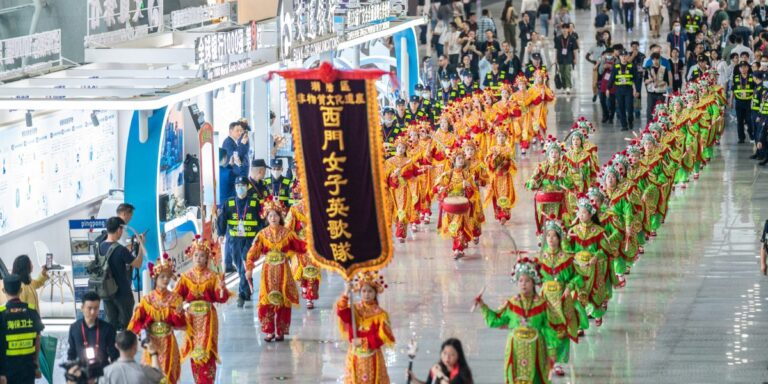
China can resist any new tariffs the world imposes on it – even the punitive ones Donald Trump plans if he wins a second presidential term – because its prices are simply too competitive to resist.
That’s the prevailing opinion at this month’s Canton Fair. Many buyers and sellers at China’s biggest trade event, held in the southern city of Guangzhou, shrugged off the risk of an escalating trade war.
“My customers told me that even a 50 percent tariff wouldn’t scare them away,” said Jack Jin, who sells cargo screening tools and truck parts in southeast China. He says about half his orders come from Americans, who can sell his products for four times what they pay for them.
Tensions between China and its trading partners are escalating in this election year in the United States, amid allegations that the world’s largest manufacturer is dumping goods and unfairly subsidizing industries. The list of targeted products is growing, including metals and ships as well as electric vehicles.
Asset said it could impose an across-the-board tariff on China of more than 60%. President Joe Biden, his opponent in the November election, pledged last week to triple taxes on Chinese steel, an area where emerging economies have also expressed concerns. The EU has launched an investigation into Chinese subsidies for electric vehicles that could lead to new tariffs within months. scrutinizing the solar and railway industries.
But traders at the Canton Fair say the world will need Chinese products no matter what. They offer workarounds for pricing. And even buyers looking for supply chain alternatives said they still expect China to remain their primary source of supply, as other countries lag behind in quality and of cost.
“Skin the cat”
Samuel Jackson, who was at the show as a buyer for a Bosnian furniture company, said he could get products of “very, very similar” quality at half the price charged by European manufacturers. Tariffs could have some impact, he said, “but China is too big a country. They have other countries to sell to.
For Alex Student, a Californian importer of automobile accessories, it is American consumers who have borne the brunt of customs duties on products manufactured in China. Its national retailers refused to pay higher prices when Trump imposed taxes and instead asked him to get producers to provide a slightly cheaper version.
“In the end, who paid? The consumer,” he said. “Either you’ve given up something in terms of product quality, or you’ve given up more money for the same product.”
The student described a way he found to offset the fares, by switching to so-called Free On Board pricing. This means that logistics and warehousing costs have been left to be borne by its US customers – and the sales price, on which tariffs are based, has fallen. There are “many different ways to skin the cat,” he said.
Chinese products are cheap, even for buyers from less developed countries. Daniel Lulandala, owner of a machinery trading company in Tanzania, was on his first trip to China and was delighted to be able to negotiate directly with local manufacturers.
He found the prices offered at the Canton Fair so low that it led him to expand his business ambitions and he now plans to open a factory at home to make building blocks, using a Chinese machine that costs around $8,000. He is convinced that he will be able to recover this sum in just three months.
“If I was here a few years ago, I might be somewhere higher now, business-wise,” Lulandala said.
Of the 125,000 foreign buyers who attended the show through April 19, only 18% came from the United States and Europe, according to organizers. This is not only due to trade tensions, but also because links with these economies are well established and buyers tend to be larger, although fewer in number. Two-thirds of participants come from the mostly emerging countries that are part of Beijing’s Belt and Road infrastructure plan, an increase from about half a decade ago.
‘Emergency plans’
Of course, the importers who made the trip to Guangzhou are likely among China’s optimists — and some producers there have expressed trade war concerns.
A saleswoman at a plastic strapping producer in Shanghai, who asked not to be identified, citing concerns about the economy, said she was worried about the prospect of another Trump presidency. She said her company had struggled in recent years, under pressure to continue developing more products even as profits were down, and described business conditions as akin to a rat race.
If falling production costs in China impress foreign buyers, they are also a symptom of weak domestic demand, where households are reluctant to spend after a prolonged real estate crisis that exposes the country to the risk of deflation. A pivot to exports could help achieve this year’s growth target of around 5%, but it would also undermine the long-term plan for domestic consumers to play a bigger role in driving the economy. economy.
Jin, the truck parts salesman, admitted to being “a little bit” worried about Trump, whom he considers more unpredictable than Biden. He is also aware of the growing competition from other emerging countries. His company stopped making a metal ring used on trucks because Indian producers, freed from customs duties, were able to offer lower prices.
The student said he began researching what he calls “contingency plans.” His company imported some products from Vietnam last year, the first time it has purchased from anywhere other than China since the 2000s, and he has turned to Thailand and Indonesia for some products.
But all these countries have a long way to go before becoming competitive with China, he said. So even in a “worst-case scenario,” China would likely get about 75% of his company’s business. “I can’t foresee it being less.”


